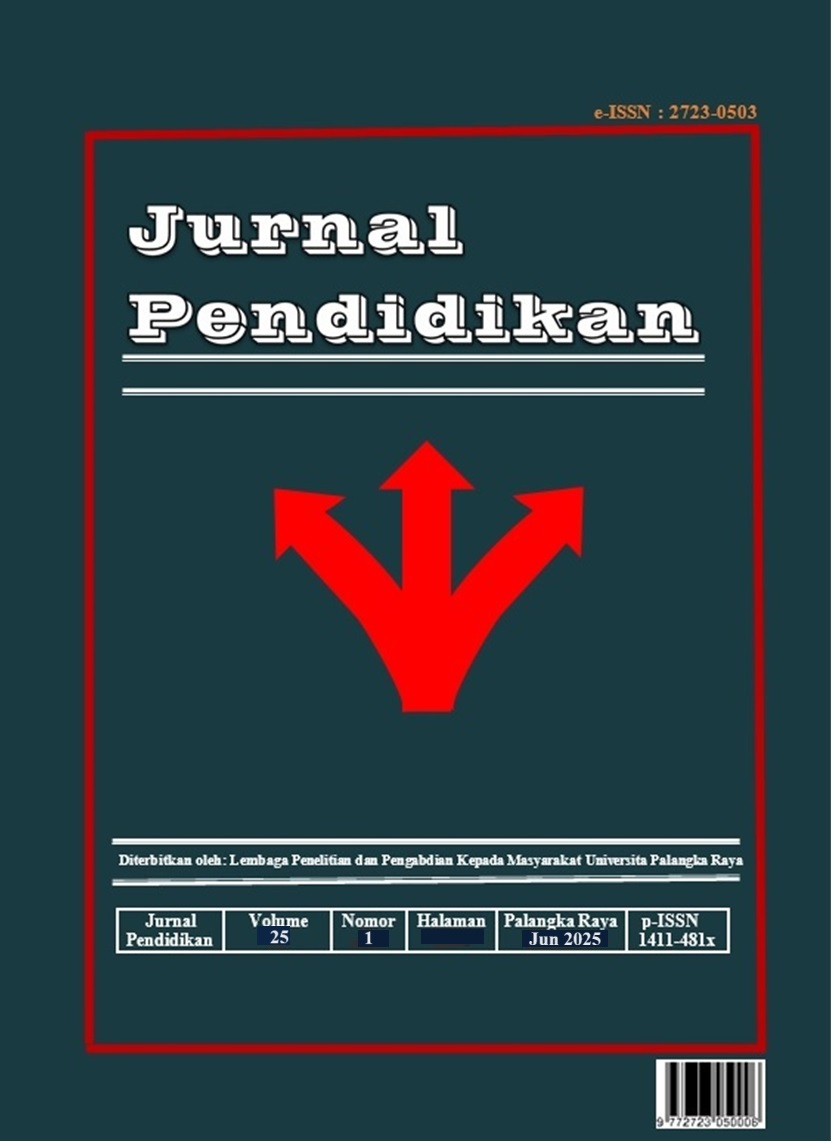The Correlation Between Parental Attention and Learning Motivation with Mathematics Learning Outcomes of Class X SMA Negeri 3 Palangka Raya
DOI:
https://doi.org/10.52850/jpn.v25i1.12925Kata Kunci:
Parental Attention, Learning Motivation, Mathematics Learning OutcomesAbstrak
Penelitian ini dilatarbelakangi hasil belajar matematika siswa di kelas X SMA Negeri 3 Palangka Raya yang masih tergolong rendah. Penelitian bertujuan untuk mengetahui: 1) Hubungan perhatian orang tua dengan hasil belajar matematika siswa kelas X SMA Negeri 3 Palangka Raya. 2) Hubungan motivasi belajar siswa dengan hasil belajar matematika siswa kelas X SMA Negeri 3 Palangka Raya. 3) Hubungan perhatian orang tua dan motivasi belajar siswa dengan hasil belajar matematika siswa kelas X SMA Negeri 3 Palangka Raya. Penelitian ini menggunakan pendekatan kuantitatif dengan jenis penelitian korelasional. Populasinya seluruh siswa kelas X SMA Negeri 3 Palangka Raya tahun ajaran 2023/2024. 247 siswa dipilih sebagai sampel menggunakan teknik cluster random sampling. Instrumen yang digunakan adalah angket perhatian orang tua 28 pernyataan valid (r11 = 0,83), angket motivasi belajar 28 pernyataan valid (r11 = 0,71), dan tes hasil belajar matematika 32 soal valid (r11 = 0,81). Uji prasyarat analisis statistik parametrik untuk uji normalitas data perhatian orang tua, motivasi belajar, dan data hasil belajar matematika dengan taraf signifikan 5% diperoleh semua data berdistribusi normal. Hasil penelitian menunjukkan: (1) Ada hubungan positif dan signifikan perhatian orang tua dengan hasil belajar matematika dengan rx1y = 0,19; (2) Ada hubungan positif dan signifikan motivasi belajar dengan hasil belajar matematika dengan rx2y = 0,21; (3) Ada hubungan positif dan signifikan perhatian orang tua dan motivasi belajar dengan hasil belajar matematika dengan rx1x2y = 0,25.
Unduhan
Referensi
Amelia, & Sumarni, S. (2022). Peran Orang Tua Dalam Mengoptimalkan Perkembangan Sosial Anak. Jurnal Pendidikan Anak, 11(2), 171-180. Retrieved from https://journal.uny.ac.id/index.php/jpa
Ahiri, J. (2017). Penilaian Autentik Dalam Pembelajaran. Jakarta: Uhamka Press.
Asih, F. (2018). Pengaruh Perhatian Orang Tua dan Kebiasaan Belajar Terhadap Prestasi Belajar Pendidikan Agama Islam Semester Gasal Siswa SMPN 2 Gringsing Batang Tahun Pelajaran 2017/2018. UNWAHAS Digital Repository, 105-110. Retrieved from http://eprints.unwahas.ac.id/id/eprint/1218
Asrah, B., Novita, R., & Fitriati. (2016). Korelasi Kedisiplinan Belajar Di Rumah Dengan Prestasi Belajar Matematika Siswa SD Negeri 19 Banda Aceh. Numeracy Journal, 3(2), 44–51. Retrieved from https://ejournal.bbg.ac.id/numeracy/article/view/208
Harianti, R., & Amin, S. (2016). Pola Asuh Orang Tua Dan Lingkungan Pembelajaran Terhadap Motivasi Belajar Siswa. Jurnal Curricula, 1(2), 20-29. Retrieved from https://ejournal.lldikti10.id/index.php/curricula/article/view/983
Lestari, K. E., & Yudhanegara, M. R. (2017). Penelitian Pendidikan Matematika. Bandung: PT Refika Aditama.
Mairing, J. P. (2017). Statistika Pendidikan, Konsep dan Penerapannya Menggunakan Minitab dan Microsoft Excel. Yogyakarta: Andi.
Nuriati, N., Suhar, S., La Ndia et al. (2021). Analisis Hasil Belajar Matematika Siswa Kelas VII SMP Negeri 1 Kabangka Ditinjau Dari Jenis Kelamin. Jurnal Penelitian Pendidikan Matematika, 141–154. Retrieved from https://ojs.uho.ac.id/index.php/JPPM/article/view/16758/11251
Ramadhani. (2022). Hubungan Fasilitas Belajar dan Motivasi Belajar dengan Hasil Belajar Matematika Siswa Kelas XI SMA Negeri 1 Kahayan Hilir. Skripsi Sarjana, tidak dipublikasikan, Universitas Palangka Raya.
Rusdiana. (2017). Hubungan Perhatian Orang Tua dan Sikap Siswa Terhadap Pembelajaran Matematika dengan Hasil Belajar Matematika Siswa Kelas XI IPS SMA Negeri 3 Palangka Raya. Skripsi Sarjana, tidak dipublikasikan, Universitas Palangka Raya.
Sardiman, A. M. (2018). Interaksi dan Motivasi Belajar Mengajar. Depok: PT. Rajagrafindo Persada.
Sari, N.R., Hidayat, W. & Yuliani, A. (2019). Analisis Hasil Belajar Matematika Siswa Kelas X SMA Pada Materi SPLTV Ditinjau Dari Self-Efficacy. UNION: Jurnal Pendidikan Matematika, 7(1), 93–103. Retrieved from https://jurnal.ustjogja.ac.id/index.php/union/ article/view/3776.
Satria, T. G. (2021). Hubungan Perhatian dari Orang Tua Terhadap Hasil Belajar Siswa Sekolah Dasar. Sekolah Dasar: Kajian Teori Dan Praktik Pendidikan, 30(1), 71-76. Retrieved from https://journal2.um.ac.id/index.php/sd/article/view/15266
Simamora, R. (2021). Hubungan Perhatian Orang Tua dan Motivasi Belajar Terhadap Hasil Belajar Matematika Siswa. MES : Journal of Mathematics Education and Science. 49-55. Retrieved from https://doi.org/10. 30743/mes.v6i2
Slameto. (2020). Belajar dan faktor-faktor yang mempengaruhinya. Jakarta: PT Rineka Cipta.
Sugiyono. (2022). Metode Penelitian Kuantitatif, Kualitatif, dan R&D. Bandung: Alfabeta.
Sugma, A. R. (2019). Hubungan Perhatian Orang Tua Dengan Kematangan Karir Siswa SMK Swasta Al-Maksum Stabat. Jurnal STKIP Al-Maksum. 1(2) Retrieved from jurnal.stkipalmaksum.ac.id/index.php/Sintaksis/article/ download/5/2
Suryabrata, S. (2019). Psikologi Pendidikan. Yogyakarta: Rajawali Pers.
Uno, H. (2018). Teori Motivasi Dan Pengukurannya (Analisis di bidang Pendidikan). Jakarta: Bumi Aksara.
Yumeri, Subagjo, A., Sugiharto. (2022). Hubungan Pola Asuh Orang Tua dan Motivasi Belajar dengan Hasil Belajar Matematika Siswa Kelas VIII SMP Muhammadiyah Palangka Raya. Jurnal Pendidikan, 23(2), 140-154. Retrieved from https://e-journal.upr.ac.id/index.php/JPN/article/view/4449.
Unduhan
Diterbitkan
Cara Mengutip
Terbitan
Bagian
Lisensi
Hak Cipta (c) 2024 Miranty Anjely Widiawanty, Suparman, Emy Artuti

Artikel ini berlisensi Creative Commons Attribution-NonCommercial-NoDerivatives 4.0 International License.





